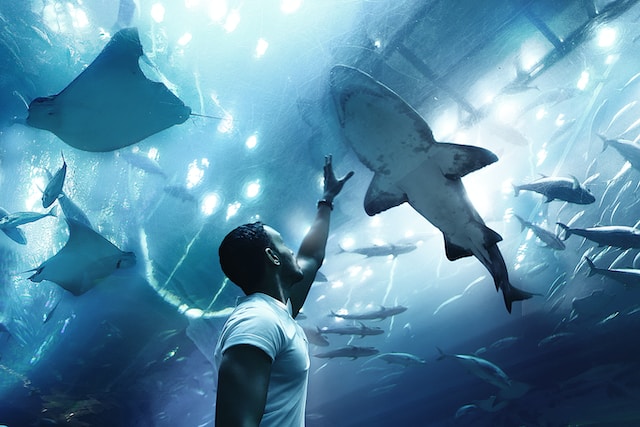Table of Contents
Have you ever wondered about the ethics of keeping fish in aquariums? As aquariums become more advanced, the question of whether they are ethical is becoming increasingly important.
In this article, we will explore the topic of aquarium ethics and delve into the various perspectives surrounding the issue. Whether you’re an aquarium enthusiast or simply curious about the topic, read on to discover the ethical implications of keeping fish in captivity.
The Ethics of Keeping Fish in Captivity
The Argument for Aquariums
Aquariums can be a source of education for the public, providing an opportunity for people to learn about fish and their habitats. They also serve as a way to conserve endangered species by breeding them in captivity and reintroducing them into the wild.
Additionally, aquariums can be a source of entertainment for visitors, providing a unique and beautiful experience.
Furthermore, aquariums can provide a controlled environment for fish, where they are protected from predators, disease, and other threats. They can also receive proper nutrition and medical care, which can increase their lifespan and overall health.
The Argument Against Aquariums
Critics argue that keeping fish in captivity is unethical, as it deprives them of their natural habitat and behaviors.
They claim that fish are social animals that require space to swim and interact with other fish. In captivity, they are often kept in small tanks, which can lead to stress, disease, and even death.
Moreover, the ornamental fish trade can have negative environmental impacts, as it can lead to overfishing and the destruction of natural habitats. Fish are often caught in the wild and transported long distances, which can cause stress and mortality.
Additionally, there is a concern about the commercialization of wildlife, as some aquariums offer opportunities for visitors to interact with animals, such as petting rays and dolphins. This can lead to the spread of diseases and incite aggression from unwelcome contact.
Overall, the ethics of keeping fish in captivity is a complex issue with valid arguments on both sides. It is important to consider the welfare of the fish, the impact on their natural habitats, and the educational and conservation benefits of aquariums.
The Impact of Aquariums on Fish and the Environment
Aquariums have been a popular hobby for decades, with millions of people worldwide keeping fish in captivity.
While aquariums can provide an opportunity for education and research, there are also concerns about the impact of aquariums on fish and the environment.
Effects on Fish Health and Well-being
Fish in captivity face a number of challenges that can impact their health and well-being. These include:
- Limited space: Fish in aquariums are often kept in small tanks or bowls that do not provide enough room for them to swim and explore. This can lead to stress, aggression, and physical deformities.
- Poor water quality: Maintaining good water quality in an aquarium can be difficult, and poor water quality can lead to health problems for fish. This can include fin rot, bacterial infections, and other diseases.
- Limited stimulation: Fish in aquariums may not have enough stimulation or enrichment, which can lead to boredom and stress. This can impact their immune system and make them more susceptible to disease.
Effects on the Environment
The impact of aquariums on the environment is also a concern. Some of the environmental impacts of aquariums include:
- Overfishing: Many of the fish sold in the aquarium trade are wild-caught, which can lead to overfishing and depletion of wild populations.
- Habitat destruction: The collection of fish for the aquarium trade can also lead to habitat destruction, as collectors may use destructive methods to catch fish.
- Introduction of non-native species: Some aquarium fish are non-native to the areas where they are sold, and if they escape or are released into the wild, they can disrupt ecosystems and harm native species.
Overall, while aquariums can provide educational and research opportunities, there are also concerns about the impact of aquariums on fish and the environment.
It is important for aquarium owners and the industry as a whole to take steps to minimize these impacts and promote the health and well-being of fish and the environment.
Alternatives to Aquariums
Virtual Aquariums
Virtual aquariums are a great alternative to traditional aquariums. They offer all the beauty and wonder of an aquarium without the ethical concerns.
Virtual aquariums can be accessed through websites, apps, and even virtual reality headsets. These aquariums offer a variety of fish and aquatic life, and often include educational information about the animals.
One of the benefits of virtual aquariums is that they can be accessed from anywhere, at any time. This makes them a great option for people who may not have the space or resources to keep a traditional aquarium. Additionally, virtual aquariums do not require any maintenance or upkeep, which can save time and money.
Aquariums with Ethical Practices
For those who still wish to keep a traditional aquarium, there are ethical alternatives available. Some aquariums have taken steps to ensure that their practices are ethical and sustainable.
These aquariums may source their fish from sustainable fisheries or breed their own fish in captivity. They may also have larger tanks and provide enrichment activities for their animals.
It is important to do research and choose an aquarium that has ethical practices. This can help to ensure that the animals are being treated humanely and that their natural habitats are not being harmed.
Some aquariums may even have accreditation from organizations such as the Global Federation of Animal Sanctuaries, which can provide additional reassurance.
In conclusion, virtual aquariums and aquariums with ethical practices are great alternatives to traditional aquariums. They offer all the beauty and wonder of aquatic life without the ethical concerns.
By choosing one of these alternatives, individuals can still enjoy the beauty of aquatic life while also being mindful of the impact on the animals and their natural habitats.
Conclusion
After considering both sides of the argument, it is clear that there are ethical concerns surrounding the practice of keeping fish in captivity.
While aquariums can provide educational opportunities and promote conservation efforts, the negative effects of the hobby and industry cannot be ignored.
One of the main ethical concerns is the acquisition of fish, particularly those that are taken from the wild. The aquarium trade heavily relies on wild-caught fish, which can have devastating effects on wild populations and ecosystems.
Additionally, the conditions in which fish are kept in captivity must be carefully considered to ensure their well-being and prevent unnecessary stress and suffering.
Creating sustainable aquariums that prioritize the health and welfare of the fish is crucial. This can include using breeding programs to reduce the reliance on wild-caught fish and providing appropriate tank sizes and conditions for each species.
It is also important for consumers to be educated on responsible fish-keeping practices and to support ethical businesses that prioritize the welfare of their fish.
Overall, while aquariums can provide educational and conservation benefits, it is important to consider the ethical implications of keeping fish in captivity and to take steps towards creating sustainable and responsible practices.







